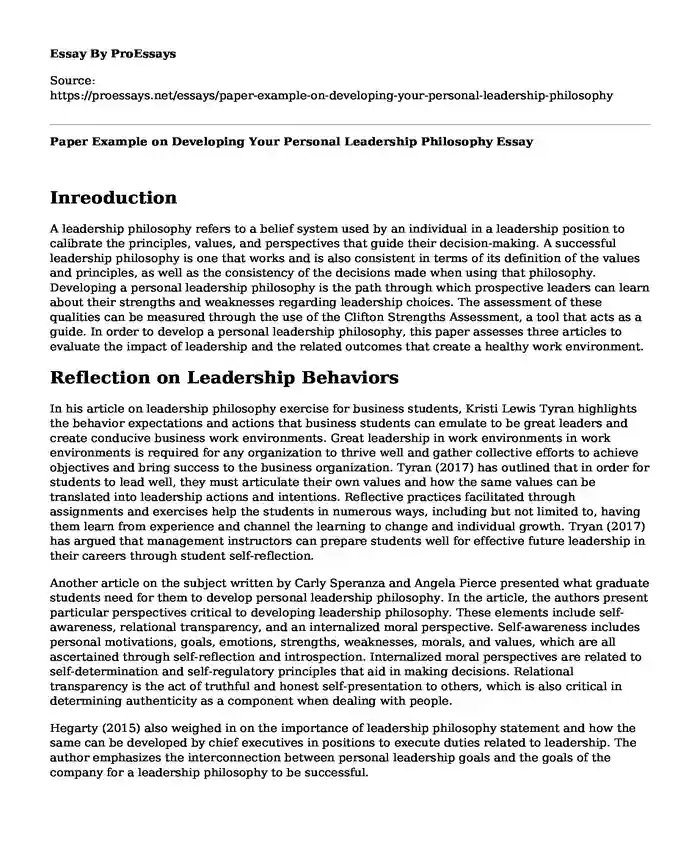Inreoduction
A leadership philosophy refers to a belief system used by an individual in a leadership position to calibrate the principles, values, and perspectives that guide their decision-making. A successful leadership philosophy is one that works and is also consistent in terms of its definition of the values and principles, as well as the consistency of the decisions made when using that philosophy. Developing a personal leadership philosophy is the path through which prospective leaders can learn about their strengths and weaknesses regarding leadership choices. The assessment of these qualities can be measured through the use of the Clifton Strengths Assessment, a tool that acts as a guide. In order to develop a personal leadership philosophy, this paper assesses three articles to evaluate the impact of leadership and the related outcomes that create a healthy work environment.
Reflection on Leadership Behaviors
In his article on leadership philosophy exercise for business students, Kristi Lewis Tyran highlights the behavior expectations and actions that business students can emulate to be great leaders and create conducive business work environments. Great leadership in work environments in work environments is required for any organization to thrive well and gather collective efforts to achieve objectives and bring success to the business organization. Tyran (2017) has outlined that in order for students to lead well, they must articulate their own values and how the same values can be translated into leadership actions and intentions. Reflective practices facilitated through assignments and exercises help the students in numerous ways, including but not limited to, having them learn from experience and channel the learning to change and individual growth. Tryan (2017) has argued that management instructors can prepare students well for effective future leadership in their careers through student self-reflection.
Another article on the subject written by Carly Speranza and Angela Pierce presented what graduate students need for them to develop personal leadership philosophy. In the article, the authors present particular perspectives critical to developing leadership philosophy. These elements include self-awareness, relational transparency, and an internalized moral perspective. Self-awareness includes personal motivations, goals, emotions, strengths, weaknesses, morals, and values, which are all ascertained through self-reflection and introspection. Internalized moral perspectives are related to self-determination and self-regulatory principles that aid in making decisions. Relational transparency is the act of truthful and honest self-presentation to others, which is also critical in determining authenticity as a component when dealing with people.
Hegarty (2015) also weighed in on the importance of leadership philosophy statement and how the same can be developed by chief executives in positions to execute duties related to leadership. The author emphasizes the interconnection between personal leadership goals and the goals of the company for a leadership philosophy to be successful.
Self-Reflection on Personal Leadership Philosophy
As an individual, my personal core values that could be used to gauge my leadership qualities include integrity, honesty, commitment, open-mindedness, reliability, efficiency, and belief in collective responsibility. These qualities are all embodied in one way or another by the contents of the three articles covered in the upper section of this paper. My personal mission statement is “To encourage, equip and involve others to believe they can achieve.” According to personal assessment using the CliftonStrengths Assessment tool, integrity, honesty, collective responsibility, and open-mindedness are some of my core capabilities that can greatly inspire my mission statement. The two behaviors I need to strengthen are efficiency and reliability through planning and proper management of time because I tend to take much time in one quality to achieve perfection. My colleagues have agreed that I take too much time on some activities to make them perfect, but this weighs down my reliability and efficiency. For instance, I tend to take too long in preparing employee performance assessment reports to ensure transparency and objectivity in the exercise, and this eats into other activities.
References
Hegarty, N. (2015). Catch My Fall: The Importance of Developing a Leadership Philosophy Statement in Sustaining Original Values and Leadership Direction [Ebook]. The Journal of Value-based Leadership. https://scholar.valpo.edu/cgi/viewcontent.cgi?article=1130&context=jvbl.
Speranza, C., & Pierce, A. (2019). Development of a Personal Leadership Philosophy: An Experiential and Reflective Opportunity in the Graduate Classroom - Journal of Leadership Education. Journal of Leadership Education. https://journalofleadershiped.org/jole_articles/development-of-a-personal-leadership-philosophy-an-experiential-and-reflective-opportunity-in-the-graduate-classroom/.
Tyran, K. (2017). Preparing to Lead: A Leadership Philosophy Exercise for Business Students. Management Teaching Review, 2(4), 258-268. https://doi.org/10.1177/2379298117698829
Cite this page
Paper Example on Developing Your Personal Leadership Philosophy. (2023, Sep 25). Retrieved from https://proessays.net/essays/paper-example-on-developing-your-personal-leadership-philosophy
If you are the original author of this essay and no longer wish to have it published on the ProEssays website, please click below to request its removal:
- Total Quality Management
- Economic Feasibility Analysis Essay
- If Students With Disabilities Can be Educated in the General Education Classroom Essay
- Developing Critical and Creative Thinking Skills for Success - Essay Sample
- Paper Sample on Help Children Living with Schizophrenia Adapt to Society
- Fixed & Variable Expenses: Impacts on Production Outputs Essay Example
- Free Paper on Bad Leaders: Celebrities & Music Makers Who Misuse Influence







